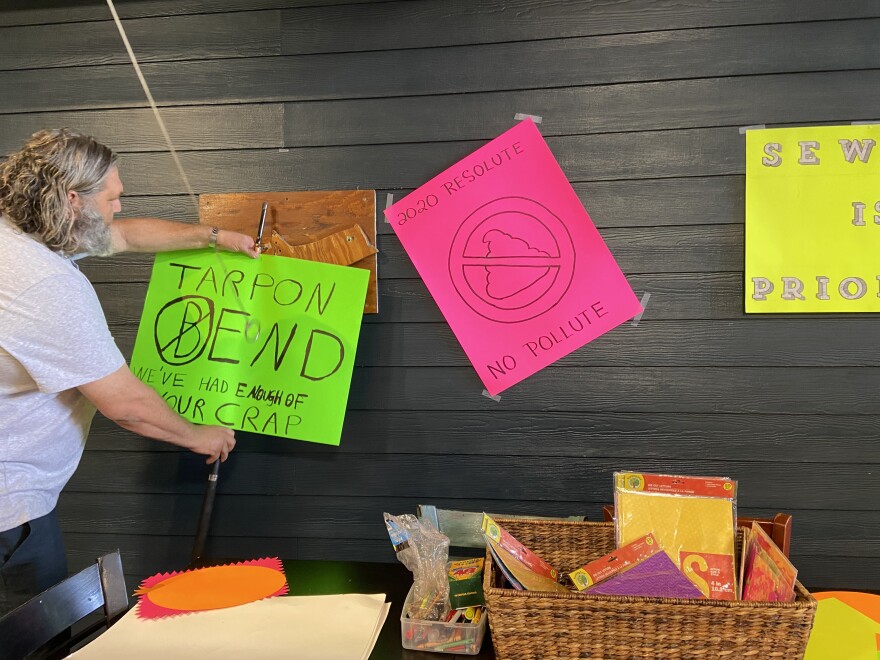This story was updated Wednesday, Sept. 23, at 1 p.m.
While city commissioners in Fort Lauderdale talked about community investment plans at last week's budget hearing, people demanded the city regularly test its waterways for toxins.
Residents have been making the plea to see a testing program implemented and funded since more than 200 million gallons of sewage spilled late last year into people's yards as well as the rivers and canals.
Sunday morning the city announced another sewer main break, spilling sewage into the Himmarshee Canal near Las Olas Boulevard. It prompted what feels like a weekly occurrence to some residents: another advisory asking people not to swim, fish, or go into the water because of a broken pipe.
WLRN is here for you, even when life is unpredictable. Local journalists are working hard to keep you informed on the latest developments across South Florida. Please support this vital work. Become a WLRN member today. Thank you.
Construction to replace one of the city's main sewer lines may be underway, but the people who called in to the city's final budget hearing, ahead of finalizing the 2021 budget, have been asking for more: they want to see residential waterways and popular recreation spots for tourists tested on a weekly basis for bacteria.
Then, they want results uploaded to a public database that's easy to access — and easy to understand.
"We can make those choices if we want to go in [the water] or be around it or not, but how do we know if that information isn't out there?" Suzee Bailey said.
She's one of the residents who has been working to get the city to fund a testing program.
"The number of fish we used to see that we don't see now, it's just sad," Bailey said. She is also the homeowners association president for the Nurmi Isles neighborhood, located on canals in the finger isles.
"The smell that we're starting to smell when we walk along the isles, it burns your eyes," she said. "I'm concerned about people's health and safety."
It came as a surprise in the middle of last Monday's budget hearing, when the mayor announced that the city just started negotiating with the nonprofit Miami Waterkeeper, to execute testing.
"Until the commission takes action, there's no official moving forward with any specific group but I can tell you we were working with that group," City Manager Chris Lagerbloom said of Miami Waterkeeper. "If we're able to successfully do that it would take them roughly 30 to 60 days to begin the testing process."
When asked for more details, a spokesperson for the city, Chaz Adams, wrote to WLRN:
"The City Commission approved the Final Budget for Fiscal Year 2021, which includes $100,000 in funding for an expanded waterway quality testing program ... With the funding approved, staff will continue to move forward as quickly as possible..."
Miami Waterkeeper already does water quality testing in 11 spots around Biscayne Bay, and on Key Biscayne in Miami-Dade County. Those programs are funded by the city of Miami and village of Key Biscayne. Then, the results get uploaded on a smartphone app called Swim Guide.
Bailey had been recommending Fort Lauderdale officials look at Miami Waterkeeper because she thinks the app is useful.
"We want to make sure the results are easy to use, easy to find and easy to understand on an app like Swim Guide," Bailey said.
The app is more of a tool for the public, but if the nonprofit sees high levels of concerning bacteria, Miami Waterkeeper's executive director, Rachel Silverstein, explained they would notify the city, county, or even local businesses depending on the situation.
"You need data that's frequent enough and over a long enough period of time to really understand what the conditions are and so you can capture changes when they happen," Silverstein said.
Miami Waterkeeper already does some work in Broward, but Silverstein confirmed the city of Fort Lauderdale reached out to try to figure out a specific scope of work that the nonprofit can do around popular public or residential waterways affected by the sewage spills.
"We do hope something works out, we would love to expand this kind of monitoring network in Fort Lauderdale," Silverstein said. "I think it would be really important, especially in light of the water quality issues that they've had lately."





